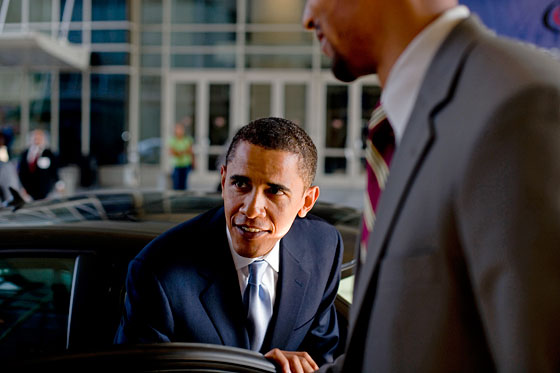 |
Barack Obama in Washington earlier this month.
(Photo: Brigitte Lacombe) |
From almost the moment Barack Obama pops out of his car, whether it’s at a town-hall meeting or a cheese-cube wingding, it’s mayhem: local officials pumping his hand, women clamoring for photos (taken by their indulgent husbands, hastily discarded pocketbooks cradled in their arms), the starstruck handing him the damnedest objects to sign (at the Illinois State Fair, one woman gives him a purple canvas sandwich cooler—“Anyone got an indelible marker?” asks an aide). The morning I connect with Obama in Effingham, Illinois, he’s got a Fox News crew in tow; the next day, at a state Democratic function in Springfield, the press vacates the ballroom where the governor is speaking—the governor must have loved that—and surrounds the senator in a loop of mikes so tight he can’t turn his face. When a local reporter discovers I’m from a publication far away, he asks if he can interview me about why I’m interested in Obama. This is what following the freshman senator has become: a small meta-chronicle of hysteria. It’s like going to view the Mona Lisa at the Louvre. All you see are the backs of people’s heads.
At almost all these stops through downstate Illinois, the senator is jacketless, RFK-style, though not tieless, which is a good thing—unlike most politicians, he has not capitulated to the tyranny of paisley. He holds people’s gazes as he speaks, and he has an unerring physical sense, knowing just how long to clasp a shoulder, linger on a hug, double-grip a hand. While Obama exudes great warmth, he doesn’t arouse the suspicion he has overrelied on sex appeal in his career, though he’s got it (six foot two, good-looking, smile like a white picket fence). People are just as apt to express their admiration around him as they are to flutter. I keep thinking of what a woman told him after the town hall meeting in Effingham: “I read your book about your father. I read the whole thing.”
The first time I have a chance alone with Obama, I ask why he thinks the world has gone gaga over him. “It’s interesting,” he says, smiling. “It is interesting.” We’re in his aide’s car, driving from a town called Palestine to another called Paris. He thinks for a moment, then suggests that perhaps the answer lies in the unique circumstances of his 2004 Senate campaign. “I sort of got a free pass, because I wasn’t subjected to a bunch of negative ads,” he says. “And nobody thought I was going to win. So I basically got into the habit of pretty much saying what I thought. And it worked for me. So I figured I might as well keep on doing it.”
Having a candid memoir already out there on the bookshelves also couldn’t have hurt. In Dreams From My Father, published nearly a decade before he was elected to the U.S. Senate, Obama freely discusses his youthful experimentation with marijuana and cocaine, and he uses the word shit—as a verb—on page four, a vivid and unambiguous choice. Did he know he’d be running for higher office when he wrote that?
“No,” he answers, then peers intently at me over the rims of his sunglasses. “But I have used the word shit before.”
Obama may be a straight shooter. But there’s one question he has a hard time answering these days, and he gets asked it a lot. At the town hall in Effingham, it takes exactly eleven minutes to come up. It’s whether he’s interested in a certain job. Candidates who are interested in it tend to attend certain dinners in Iowa, where Obama would go the following month. “I’m looking for an intelligent, highly educated man,” says a Democratic precinct committeeman from a nearby county. “Someone who hasn’t been around long enough to be labeled by the opposition in ’08—”
Obama tries to cut him off. “Uh, I think this is a setup—”
“Someone,” the committeeman plows on, “who was not from the Northeast for a change, but from, say, a large midwestern state, someone who was opposed to the war in Iraq from the beginning, someone who’s not afraid to discuss his religious experiences—”
“Um—”
“Someone who’s charismatic—”
“Uh—”
“Someone who could unite his party, unite black and white, who’d have the unwavering support of his own state. Do you know anyone like that?”
“I don’t,” said Obama, smiling but looking mildly relieved. “But if I run into the guy, I’ll let you know.”
At some level, possibly the most basic one, the mania surrounding Barack Obama is a simple function of his age—or, as John F. Kennedy would have said, his vigor. At 45, he’s fifteen years younger than the average senator in the 109th Congress, and he’s thirteen years younger than Hillary Clinton, the presumptive Democratic nominee in 2008. (Al Gore is also 58. And John Kerry is 63.) As Simon Rosenberg, head of the New Democratic Network, says, “Obama has already established himself as the paramount leader of the next generation. There’s no one even close.” There’s something to be said for a politician who didn’t come of age wearing sideburns and listening to Simon and Garfunkel. Obama suggests there might be another way to think about politics, to speak about politics, to write about politics. It’s certainly what Crown Publishing was counting on when it awarded him with a $1.7 million, two-book contract 21 months ago. The first book, The Audacity of Hope, will be hitting bookstores in mid-October.